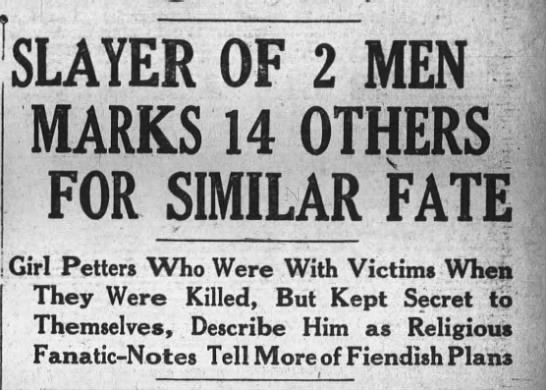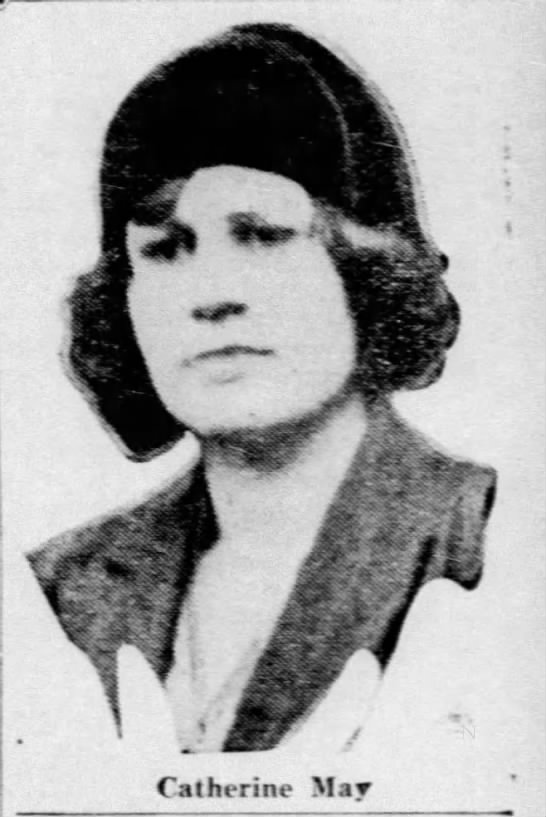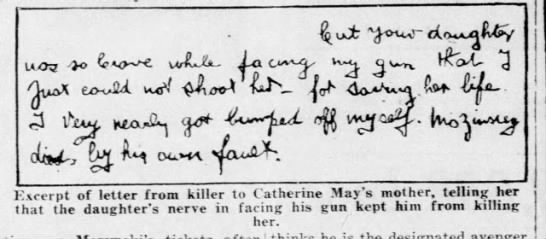 |
| "Brooklyn Standard Union," June 18, 1930, via Newspapers.com |
A major reason serial killers such as Jack the Ripper, “Son of Sam,” and “Zodiac” have gained legendary fame is the fact that they (allegedly, in the Ripper’s case) wrote cryptic, taunting letters to the public, thus adding an element of mystery and intrigue to their evil acts. Curiously enough, however, the murderer who wrote arguably the weirdest messages of all soon became almost forgotten.
The night of June 11, 1930, kicked off an eerie reign of terror in New York City. 19-year-old Catherine May and a grocer named Joseph Mozynski were sitting in Mozynski’s parked car on a street in Queens. Then a man suddenly walked up to them and shot Mozynski dead through the open window. The assassin then calmly pulled May out of the car and walked her to a bus stop. Before leaving her there, he gave the girl a sheet of paper, warning her not to read it until the following day.
 |
| "New York Daily News," June 20, 1930 |
The paper had the name “Joseph Mozynski” rubber-stamped in red ink. Under it was stamped “3X” and “3-X-097.” Unintelligible as this message was, it did make it obvious that this was no random crime; the grocer had, for whatever reason, been targeted in advance. The paper’s watermark failed to provide any clues to who might have bought it.
Shortly after this, the murderer began sending the “New York Evening Journal” letters signed “3-X” that were as verbose as they were bizarre. He claimed to be “the agent of a secret international order” who had shot Mozynski in order to obtain “international papers” the grocer supposedly had in his possession, but, alas, his victim was not carrying them at the time. Most alarmingly, “3-X” asserted that he would soon kill again in Queens. His intention was to murder thirteen men and one woman.
If 26-year-old salesman Noel Sowley and 20-year-old Elizabeth Ring were aware of this ominous warning, they seem to have ignored it. This was unwise. On the night of June 17, the couple was sitting in Sowley’s car on a deserted back street in Queens, not very far from where Mozynski had been murdered. (Although Ring had recently married, she and Sowley--an old flame--continued to see each other.) A stranger walked up to the car, pointed a gun at Sowley, and ordered him to produce his driver’s license. After studying it, the man announced, “You’re going to get what Joe got,” and fired two instantly fatal blasts into Sowley’s head.
As had been the case in the previous murder, “3-X” treated the female witness with a curious sort of gallantry. After depositing a newspaper clipping about the Mozynski murder into the dead man’s pocket, the killer shepherded Ring to a bus stop and gave her yet another paper. It was stamped in almost identical fashion as the paper he had given Catherine May.
 |
| "Brooklyn Times Union," June 18, 1930 |
Tests proved what everyone already suspected: that the two men had been killed with the same gun. May and Ring described the murderer as about 5’6”, with a strong accent--Ring thought he was German. He was in his thirties, with a thin face and “peculiar teeth.”
 |
| "New York Daily News," June 19, 1930 |
The day after Sowley’s murder, “3-X” sent the “Evening Journal” a note announcing that he was about to murder a man in College Point, Queens. Naturally, that entire area quickly became what the “New York Times” described as “an armed camp.” The streets of the Queens were packed with over 400 plainclothes detectives, two thousand patrolmen, and bands of motorcycle, auto, and gun squads. It was the largest manhunt the NYPD had seen up to that point.
The police presence backfired by being just too obvious. The murderer may have been insane, but he was obviously not stupid. “3-X” was nowhere to be seen. The police could only throw up their hands and warn couples to avoid parking in isolated streets--advice which was, at this point, probably superfluous.
On June 18, John Gallagher, the chief detective in Queens, received a 3-X letter:
For your information, one more of J. Mozynski’s friends was sent to meet him.
V-5 Solwey was shot near Floral Park and not very far away from police signal station.
I enclose the two empty shells--some of our money was found on his person and the N.Y. document.
The girl was, as in the case of Miss May, put aboard a bus and sent home--but no clues were left for you this time. Thirteen more men and one woman will go if they do not make peace with us and stop bleeding us to death.
P.S. These facts have been disclosed to the New York Evening Journal.
The letter also mocked the police for failing to capture him. As indicated in the note, the killer sent a similar letter to the “Evening Journal,” as well as Catherine May. “3-X” told the “Journal” that “The young lady involved in this case is a victim of unfortunate circumstances. Her story is clean. I happen to know something of what happened Wednesday night. Mozynsky was a rascal. He had important papers belonging to us. We feel sorry for his wife and children, but is for the best that they shall not know what he was.”
This remarkably wordy killer sent yet another letter to the police advising them that he had revised downward his projected death toll; he would murder only seven people instead of fourteen. The maniac also warned that Mozynski’s brother would be killed if “the secret papers” were not returned. The understandably terrified Mozynksi family insisted to detectives that they had no idea what the killer was talking about.
“3-X” then sent the “Evening Journal” his longest and nuttiest letter:
Dear Sir: "V. R. V8 of C. P. has returned the Philadelphia XV346 to me tonight after reading your paper--also 37,000 dollars of the black mail money--thanks to God--if I may use his name.
This means the following persons will be spared:
W. R. VS College Point.
S 12 College Point.
K 2 Brooklyn.
Z 3 (the woman in question, the tall blonde).
M 6 N.Y.C.
XX V (NYC Police Dept. Detective).
The following document still is missing--NJ 4-3-44--and 39,000 dollars for this document, the following people still are marked for death:
X-14.
X-7.
X-21.
X-1.
Y-2.
Y-4.
L-6.
All initials withheld--too much of a clew for the super detectives of Bayside.
Mozinsky's number was R-9.
Sowley's number was X-4.
Please print this final message to the seven men left on the death list:
N. J. CCK-2-33-VV 3-K-RQS-4MLT-R. P. 49-6.
As in the Mozinski case, the girl with Sowley was sent home. She, also, proved to be an iron woman. I had to put the gun close to her breast to quiet her. She even tried to start the car.
But when I told her I would fire she then, to my surprise, began to say her prayers, and to prepare herself for death.
This saved her, as God is the only one I fear, and I could not shoot a woman showing such courage.
Both Miss Catherine May and this young lady are splendid women--I never thought there were such women in this life.
Well, I have told you that J. Moissett was innocent. Who was right? I repeat it again. Miss Catherine May is innocent. I have written to her mother about it. Here is something to prove it. On the night Mozynsky was shot I told Miss May that I was after some important papers.
I told her Mozynski had them, but I could not find them. I told her that Mozynski 'was a blackmailer and a drug peddler. I also asked her if she knew Mozynski and she told me no, that he just picked her up for a ride.
So I thought the girl would be o.k. and I burned some papers near the car, they were envelopes addressed to Miss Catherine May, but stained with blood so as not to leave any clews against the girl as I did not want her to suffer on account of me.
But it seems she forgot her coat and that's what lost her. Well, the poor girl is in a terrible mess now but I will do all I can to prove her innocent.
The shooting of Sowley should show it by now, and also a second warning to the rest. I know who the other girl is, and where she lives, and, as she happens to be of good family, she has nothing to fear, I never will reveal who she is. I have never seen women act like that before.
As for the detectives, and their commanding officer, to my estimate well, what's the use?
Sorry for them that's a black mark against them. But they never will find out who I am. One word from any one means death or a long term to state or federal penitentiary. Again thank you for your kindness.
I told Sowley's lady friend that we knew who we were after. No one needs fear me, only those marked for death, and I hope they heed the warning. I will not shoot any until they decide their own fate. I am only too glad to give them a chance.
I have been in the war. in the very thick of it, but to kill like this is terrible, but it had to be done.
We trailed Sowley as we knew he was in the habit of taking his girls there. I was on the highway waiting for him with A2 and M2 with M5 were trailing in our car behind. Sowley must have recognized me as he tried to run me over.
His business--you would like to know--well, here it is, everything--there is money, easy money, in it.
Does it not seem funny that both Mozinski, R9, and Sowley, X4, were very mysterious? Both are ladies’ men--and it takes a lot of money these days to keep ladies going.
There is a dead account in a Flushing bank, the money belongs to Mozinski. but it is not under his right name. We know where they got the money from. I did not like to shoot.
But, I sent a code signal for mercy. Unfortunately the answer came back from the car “No--fire.” I had to obey, or get it myself. You see. I have turned up the king of diamonds.
A V 3 X)
P.S.S. Later I will explain the meaning of the triangle and the V.
This masterpiece of Crazy certainly drew a great deal of attention to the killer, but--even though his letters indicated he must have genuinely been somehow acquainted with his victims--they were of no help in establishing his identity.
On the night of June 19, hundreds of police again patrolled the streets of Queens in search of “3-X.” At around 10:30, Morris Horwitz, president of the Municipal Underwriters insurance firm, sat in his car outside his Brooklyn home, talking to his wife, Rose, who was sitting on the porch. Suddenly, a short, blond, “crazy-looking man” forced his way into the car. He ordered Horwitz to move over to the steering wheel, “start the car and keep going. If you don’t, I’ll shoot you.” Before Horwitz could comply, the man shot him in the shoulder and fled. Thankfully, Horwitz survived his injuries. It was unknown if this was yet another attack by “3-X” or just a random robbery attempt.
“3-X” informed the “Evening Journal” that he had murdered one Harold Bridenbach (code name “X8W-9”) and that the body could be found on the Boston Road in the Bronx. No body was found on the Boston Road, and, as far as the police could tell, no such person named Harold Bridenbach even existed. The handwriting on the letter differed from the previous “3-X” letters, so it is possible this message was just an example of the sick hoaxes that surround all notorious crimes. This was followed by a letter in the now all-too-familiar “3-X” writing threatening to kill actress Margalo Gillmore. Fortunately, this plan was never carried out.
On June 21, the prolific “3-X” wrote the “Journal” that they would hear no more of him. His work for the “Russian Red Diamond Society” was complete, and he was about to fly back to Europe in a secretly chartered airplane. “Three X is no more,” he proclaimed. “My mission is ended.”
In his farewell message, the killer claimed to be an ex-German army officer who during WWI, served in the Wilhelm St. office, Berlin. He explained his coded signature. “The first sign means A, the supreme tribunal of the order. The second V it’s secret agent. The two combined form the Red Diamond of Russia, a secret order all over the world. Anyone breaking its rules is marked for death.”
He went on to say that the men he murdered had been dismissed from the order for treason. One of his victims stole certain documents and tried to use them to blackmail certain of the Red Diamond agents in America. “3-X” had been chosen by the order to punish, and, if necessary, kill the traitors.
On June 19, he explained, he recovered the documents he wanted, making it unnecessary to commit the third murder he had planned. He added, “I am deeply sorry for having stained your country with blood...Quiet your people and tell them 3 X is no more. If any more letters come they are fakes. I am leaving today on my way back to Russia. Please note I do not write U.S.S.R. We do not recognize them.”
The murderer again paid tribute to the courage of Catherine May and Elizabeth Ring, and expressed how wounded he had been when one of the women described him as having “fish eyes.” “I have no fish eyes--the police have fish eyes.” He “signed” the letter “H.P. 12. W.A.”
Despite receiving this entirely rational and believable explanation for his actions, the police continued their hunt for “3-X.” Who knew who might be designated next as a traitor to the Red Diamond. For some time, they pursued increasingly weak leads. Several days after the killer’s swan song, a drifter named Dewey Ede told police that at a restaurant outside of Coatesville, Pennsylvania, he met an oddly talkative stranger. The man’s wallet contained a bunch of papers written in code. According to Ede, his new friend confided that he had murdered two men in Queens and tried to kill a third. He claimed to be “3-X,” chosen assassin of the Red Diamond of Russia. He was on his way to Harrisburg, and then to New Orleans, where he would take a boat back to his homeland. Ede’s description of the man matched those provided by other witnesses. Was this “3-X,” or had Ede invented a nifty way to get his name in the newspapers? No one could say. It’s a very odd story, but then, we are dealing with one very odd killer. Several men who, for various reasons, aroused the suspicions of the police were taken in for questioning, but May and Ring did not think any of them could be “3-X.”
On June 23, it briefly looked as if the murderer had broken his promise to leave the country and kill no more. The police received a letter, purportedly from “3-X,” threatening to kill a Brooklyn man named Meyer Newmark if Newmark did not turn over document “U.J. 4-3-44.” The coded signature differed slightly from earlier letters, but the handwriting seemed similar. Fortunately, Newmark--who professed to have no idea why he was being targeted--remained unharmed.
The case faded from the newspapers until October 1931, when the police received a note warning “I am back. I will pay every cop a visit.” Handwriting experts believed it was a genuine “3-X” message. If such was the case, the killer again failed to go through with his threat.
This proved to be the last anyone heard from “3-X.” No one ever managed to even find a plausible suspect for these extraordinarily strange murders, and at this late date, it is virtually certain that no one ever will.
A contract killer would not leave witnesses and a secret society would not court publicity. Nor is it likely that so many of its former members would congregate in the same area. If Sowley was one, why didn’t he hide or flee as soon as he heard about the first murder? If 3-X was a lunatic, why did he stop?
ReplyDeleteIt’s more likely that it was a local man with a grudge against Mozynski and Sowley, and the 3-X notes were just a smokescreen. He knew their habits. He clearly knew Mozynski by sight because he shot him immediately, suggesting that he might have been one of Mozynski’s customers, but had to confirm Sowley’s identity.
As for motive, my guess is that it was a jilted lover or cuckolded husband taking his revenge and the circumstances of the murders were intended to make a point.
I've never heard of this. The murderer certainly is the weirdest of serial killers; his conspiracy-theory ramblings are somehow more unsettling than the usual crazy killer. Of course, he wasn't genuinely part of any secret order. Why, for instance, write to a newspaper in order to get a citizen to return papers? Just threaten him directly. But who can say what world the lunatic constructed in his mind, if he was insane at all.
ReplyDelete